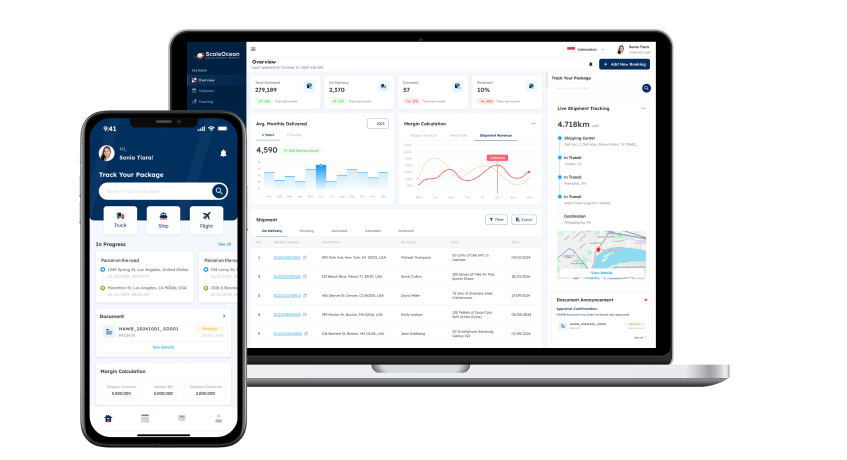As global trade keeps expanding, businesses are finding it more crucial to optimize their logistics. For companies in Singapore, a key hub in international trade, staying competitive means embracing the latest technologies to improve supply chain processes and reduce inefficiencies.
Freight forwarder software has become an essential tool for businesses to automate and manage their logistics efficiently. According to Mordor Intelligence, with the Singapore freight and logistics market projected to grow from USD 26.11 billion in 2026 to USD 35.37 billion by 2031, it’s clear that innovation is key to staying ahead in the industry.
It helps companies increase productivity, decrease mistakes, and save money. This guide will explore the best 12 freight forwarder software solutions available, such as ScaleOcean, GoFreight, and CargoWise, help businesses choose the right platform to meet their specific needs and stay competitive in today’s fast-paced global marketplace.
- Freight forwarder software is a digital-based tool that combines and simplifies all essential logistics tasks into one platform.
- Key features of freight forwarder software include user-friendly interfaces, rate management, booking, quote management, automated document generation, and more.
- Explore a review of the top 12 freight forwarder software options, such as ScaleOcean, GoFreight, CargoWise, Freightview, Freightify, and more.
- ScaleOcean Freight Forwarder Software is one of the advanced ERP solutions built specifically for today’s freight forwarding businesses.

What is Freight Forwarder Software?
Freight forwarder software is a digital-based tool that combines and simplifies all essential logistics tasks into one platform. It automates everything from booking shipments to handling documentation and tracking in real time. This software makes it easier for freight forwarders and logistics companies to work more efficiently and reduce mistakes.
With this software, logistics businesses can manage every aspect of freight forwarding in one place. From getting quotes and booking shipments to handling customs paperwork and tracking, it helps boost visibility and control while cutting down on delays and errors.
It covers quoting, booking, documentation, customs compliance, and real-time tracking. This streamlines operations and reduces the need for manual work, making everything run smoother and more efficiently.
Freight forwarders simplify global transportation by ensuring timely and cost-effective delivery across borders. They handle logistics, including warehousing, transportation, and customs clearance. According to Clarksons, for air freight, customs can generally be cleared within 1–2 hours of arrival, improving efficiency and reducing delays.
Key Features of Freight Forwarder Software
Freight forwarder software is essential for efficient logistics, offering key features that streamline operations and empower modern shipping and global trade, ensuring smooth and cost-effective supply chain management.
So, take a look here at the key benefits and features of Freight Forwarder Software:
- Easy-to-use and intuitive interface: Ensures a seamless and simple user experience, making it easy for businesses to navigate and operate the system efficiently without a steep learning curve.
- Rate Management: Simplifies rate evaluation, negotiation, and storage, ensuring businesses achieve the best pricing and maintain tight control over shipment costs for greater profitability.
- Booking: Streamlines the booking process by enabling efficient scheduling and space confirmation across different carriers and transport methods, improving overall booking speed and accuracy, especially when collaborating with third-party logistics (3PL) providers.
- Quote Management: Facilitates quick and accurate quotation generation for various shipments, enabling businesses to respond to customer requests faster and with better pricing accuracy.
- Document Generation: Automates the generation of vital shipping documents like Bills of Lading, invoices, and customs forms, ensuring all paperwork is accurate and complies with industry regulations.
- Customs Management: Handles the complexities of customs declarations, including taxes and duties, ensuring smooth and compliant international shipments with minimal risk of penalties.
- Shipment Tracking: Provides up-to-the-minute updates on shipment status, offering full transparency and proactive communication to both businesses and customers for seamless deliveries.
- Analytics and Reporting: Delivers comprehensive insights into shipment data and key performance metrics, enabling businesses to identify opportunities for improvement and enhance operational efficiency in the warehouse logistics process.
- Customer Service: Manages customer interactions and inquiries with dedicated tools to ensure prompt responses and foster better relationships, ultimately increasing customer loyalty and satisfaction.
- Security and Compliance: Utilizes strong security measures to safeguard sensitive data and ensure adherence to privacy regulations, helping companies avoid penalties and maintain customer trust.
- System Integration: Offers the ability to integrate seamlessly with existing solutions like Transportation Management Systems (TMS) and ERP platforms, creating a unified and efficient workflow across all business systems.
- Growth and scalability: Provides flexibility to scale up operations as the business grows, offering the tools necessary to handle increasing demand and complexity in logistics processes.
Comparison Table of the 12 Best Freight Forwarder Software
In the fast-paced world of logistics, choosing the right freight forwarder software can significantly impact efficiency and cost-effectiveness. With so many options available, it’s important to find a solution that fits your business size and operational needs.
To help you make an informed decision, here’s a comparison table of the 12 best freight forwarder software:
| Software | Key Features | Best For |
|---|---|---|
| ScaleOcean | Booking, Real-time Tracking, Customs Integration, Margin Calculation, Multi-modal Support | Medium to large freight forwarding companies need a comprehensive logistics solution. |
| GoFreight | Shipment Management, Automated Workflow, Real-time Tracking, Financial Tools | Medium-sized businesses are looking for a cloud-based platform to simplify global trade processes. |
| CargoWise | Multi-modal Platform, Customizable, Automation, Integration | Large enterprises manage complex global logistics and supply chain operations. |
| Freightview | Rate Comparison, Shipment Booking, Real-time Tracking, Custom Reporting | Small to medium businesses need easy multi-carrier shipping management. |
| Freightify | Shipment Tracking, Customer Portal, Automated Docs, API Integration | Small to medium freight forwarders are automating operations and improving collaboration. |
| Magaya | Integrated Freight Forwarding, Customs Tools, Accounting, Tracking | Medium-sized businesses need an integrated system for freight, warehousing, and accounting. |
| Logitude World Ltd | Shipment Tracking, Accounting, CRM, Custom Reporting | Small to medium freight forwarders need customizable platforms with integrated CRM. |
| Shipthis | Instant Quoting, Booking, Tracking, Customer Portal | Medium-sized businesses looking to digitize operations with quoting, booking, and tracking tools. |
| Fresa Gold | Shipment Management, Document Tools, Accounting, CRM | Small to medium businesses need an all-in-one platform for shipment and customer management. |
| CargoNet | Multi-location Integration, Document Handling, BI, CRM Tools | Small to medium businesses managing multi-location shipments with improved visibility. |
| Descartes | Trade Data, Rate Optimization, Shipment Tracking, Carrier Collaboration | Large logistics companies manage global trade data and complex logistics processes. |
| Linbis | Document Handling, Accounting, CRM, Custom Reporting | Small to medium businesses need a cloud-based platform for logistics and customer management. |
12 Best Freight Forwarder Software in Singapore
Choosing the right freight forwarder software is crucial for streamlining operations and improving efficiency. Below are the top 12 solutions available in Singapore that can enhance logistics management for businesses:
1. ScaleOcean Freight Forwarder Software
ScaleOcean Freight Forwarder Software is an advanced ERP solution built specifically for today’s freight forwarding businesses. It makes managing the shipping process easier by handling everything from booking to real-time tracking and customs clearance. The system helps you streamline operations and reduce mistakes, saving time and money.
Whether you’re managing sea, air, or land shipments, ScaleOcean ensures that both local and global shipments run smoothly. It works seamlessly with customs systems like Ceisa 4.0 and offers useful features such as margin calculations and document management. This leads to better accuracy and less hassle in your day-to-day operations.
With ScaleOcean, you can take advantage of CTC grants to help optimize your logistics costs. Experience it for yourself with a free demo and see firsthand how it can help you improve your freight forwarding business.
Key features:
- Booking Management: Streamlines multi-modal booking and logistics.
- Real-time Shipment Tracking: Monitors cargo location and status.
- Customs Clearance Integration: Ensures regulatory compliance and automation.
- Margin Calculation: Automatically calculates profit margins per shipment.
- LCL, FCL, FTL, LTL Support: Flexible shipping options for various load types.
| Pros | Cons |
|---|---|
|
|
2. GoFreight Cloud-Based Software
GoFreight is a cloud-based freight forwarding software designed to revolutionize logistics operations. Serving as an intelligent command center, it simplifies global trade by centralizing and streamlining processes like quotations, bookings, customs, real-time tracking, and financial management.
By enhancing efficiency, reducing errors, and boosting profitability, GoFreight acts as a strategic partner for seamless, scalable logistics in a competitive market.
Key features:
- End-to-end Shipment Management
- Automated Workflow & Task Management
- Real-time Tracking & Visibility
- Integrated Financial & Accounting Tools
| Pros | Cons |
|---|---|
|
|
Best for: GoFreight is best suited for medium-sized freight forwarding businesses looking for a cloud-based platform that simplifies global trade processes, improves operational efficiency, and centralizes booking, tracking, and financial management.
3. CargoWise Freight Forwarder Platform
CargoWise is a global enterprise platform for managing complex logistics and supply chain operations. It serves as a command center, handling freight movements across air, sea, and land, along with warehouse management, customs, and financial processes.
Designed for scalability, it provides control, visibility, and efficiency, helping businesses optimize supply chains, reduce costs, and stay competitive. More than software, it’s the foundation for global logistics success.
Key features:
- Global, Multi-Modal Platform
- Deeply Integrated System
- Highly Configurable & Customizable
- Advanced Automation & Optimization
| Pros | Cons |
|---|---|
|
|
Best for: CargoWise is perfect for large enterprises and multinational logistics companies that need a scalable, customizable platform capable of managing complex global logistics, including freight movements, warehousing, customs, and financial processes.
4. Freightview System Software
Freightview is a cloud-based Transportation Management System (TMS) designed to streamline and simplify freight shipping for businesses. It consolidates rate shopping, booking, tracking, and reporting into a single platform.
Freightview lets you compare quotes, book shipments, track progress in real-time, and gain insights into your shipping operations. It streamlines managing LTL and TL shipments, saving you time and money.
Key features:
- Multi-carrier rate comparison
- Shipment booking and document management
- Real-time tracking
- Customizable reporting and analytics dashboards
| Pros | Cons |
|---|---|
|
|
Best for: Freightview is ideal for small to medium-sized businesses that need an easy-to-use platform for managing multi-carrier shipping, streamlining rate comparisons, and improving shipment visibility across different carriers and transport modes.
5. Freightify Freight Platform
Freightify is a cloud-based digital freight platform that empowers freight forwarders to automate and streamline their operations. It provides tools for instant quoting, online booking, real-time tracking, and customer collaboration.
Freightify modernizes freight forwarding with a digital-first platform, enhancing efficiency and transparency for forwarders and customers by streamlining the sales cycle and operational management.
Key features:
- Real-time shipment tracking
- Customer portal
- Automated documentation
- API integration
| Pros | Cons |
|---|---|
|
|
Best for: Freightify works best for small to medium freight forwarders seeking a digital-first platform that automates quoting, booking, tracking, and customer collaboration while enhancing operational transparency and efficiency.
6. Magaya Freight Software
Magaya is a freight and supply chain management software platform. It offers several integrated modules that address freight forwarding, warehousing, customs brokerage, accounting, and other topics.
Magaya intends to consolidate all aspects of logistics operations into a single, centralized system, allowing firms to control their complete supply chain workflow from quote to final delivery. In essence, it’s a powerful solution for optimizing and integrating all aspects of a logistics business.
Key features:
- Integrated freight forwarding
- Custom brokerage and compliance tools
- Accounting and financial reporting functionalities
- Real-time tracking and shipment visibility
| Pros | Cons |
|---|---|
|
|
Best for: Magaya is best suited for medium-sized logistics businesses that require an integrated system for managing freight forwarding, warehousing, customs brokerage, accounting, and real-time shipment visibility all within one platform.
7. Logitude World Ltd Freight Forwarding System
Logitude World Ltd. provides a cloud-based Freight Forwarding Software (FFS) that automates and streamlines core operations like quoting, booking, shipment tracking, accounting, and CRM.
The platform enhances efficiency by digitalizing and optimizing workflows, enabling freight forwarders to manage shipments and customer interactions in a unified digital environment.
Key features:
- End-to-end shipment tracking
- Integrated accounting and financial management
- CRM tools
- Customizable reporting and data analytics
| Pros | Cons |
|---|---|
|
|
Best for: Logitude World Ltd is designed for small to medium-sized freight forwarders needing an easy-to-use, customizable platform for managing shipments, customer interactions, and financials with integrated CRM tools.
8. Shipthis Freight Forwarding Solution
Shipthis is a cloud-based digital freight forwarding platform designed to modernize and automate freight operations. It offers tools for instant quoting, online booking, real-time tracking, customer collaboration, and comprehensive reporting.
Shipthis enhances efficiency and transparency by digitizing freight forwarding processes, enabling seamless shipment management and customer interactions. It focuses on boosting operational agility and customer satisfaction through digital transformation.
Key features:
- Instant online quoting and booking functionality.
- Real-time shipment tracking and status updates.
- Customer portal for collaborative communication.
- Automated documentation and workflow management
| Pros | Cons |
|---|---|
|
|
Best for: Shipthis is ideal for medium-sized freight forwarding companies looking to digitize their operations with instant quoting, booking, real-time tracking, and customer collaboration tools for improving customer satisfaction and operational agility.
9. Fresa Gold Freight Forwarding Software
Fresa Gold is a cloud-based freight forwarding and logistics management software designed to streamline operational workflows. It provides tools for managing shipments, documentation, accounting, and customer relationships.
Fresa Gold is a software solution designed to enhance efficiency and visibility in freight forwarding by automating and optimizing daily tasks on a unified digital platform.
Key features:
- Shipment management
- Document generation tools
- Accounting and financial modules
- CRM features
| Pros | Cons |
|---|---|
|
|
Best for: Fresa Gold is best for small to medium-sized businesses looking for an all-in-one platform that streamlines shipment management, document generation, and customer relationships while offering accounting and CRM capabilities.
10. CargoNet Freight Forwarding Platform
CargoNet is a freight forwarding and logistics management software platform. It provides tools for managing shipments, documentation, accounting, and customer interactions, with a focus on streamlining operations and improving visibility.
CargoNet aims to offer a centralized platform for freight forwarders to manage their entire workflow, from quotation to delivery. In essence, it’s designed to automate and integrate core freight forwarding processes.
Key features:
- Multi-location data integration
- Document generation and handling
- Business Intelligence (BI)
- Customer relationship management (CRM) tools.
| Pros | Cons |
|---|---|
|
|
Best for: CargoNet is best for small to medium-sized logistics companies that require a centralized platform for managing multi-location shipments, document handling, and customer relationships with improved visibility and control.
11. Descartes Freight Solutions
Descartes offers a suite of cloud-based logistics and supply chain management solutions, including specialized modules for freight forwarders. It provides tools for shipment management, compliance, rate management, and global trade data.
Descartes optimizes complex logistics operations using advanced technology to improve efficiency and visibility across the supply chain. It’s a comprehensive platform for managing and streamlining global logistics processes.
Key features:
- Global trade data and compliance management
- Advanced rate management and optimization tools
- Multi-modal shipment tracking and visibility
- Network connectivity for carrier collaboration
| Pros | Cons |
|---|---|
|
|
Best for: Descartes is ideal for large logistics companies that require a comprehensive platform for managing global trade data, complex logistics processes, rate management, and multi-modal shipment tracking to ensure seamless supply chain management.
12. Linbis Freight System
Linbis is a cloud-based logistics and freight forwarding software designed to streamline operations and enhance visibility. It offers tools for managing shipments, documentation, accounting, and customer relationships.
Linbis offers freight forwarders a comprehensive platform to automate and integrate key logistics processes, streamlining workflows from quotation to final delivery.
Key features:
- Document generation and handling tools
- Integrated accounting and financial modules
- Customer relationship management (CRM) features
- Customizable reporting and data analytics
| Pros | Cons |
|---|---|
|
|
Best for: Linbis is ideal for small to medium-sized freight forwarders seeking a cloud-based platform that integrates logistics, accounting, CRM, and customizable reporting to streamline operations and improve visibility across shipments.
Factors to Consider When Choosing Freight Forwarder Software
Choosing a suitable freight forwarder software is an important decision that affects productivity and growth. Businesses must carefully analyze the factors to choose a solution that genuinely meets their company’s specific needs, as explained below:
- Business Size and Scalability: Choose freight forwarding software that matches your current business size and offers flexibility for future growth. The software should scale to accommodate increasing shipment volumes, users, and operational complexity without performance issues or costly upgrades.
- Specific Needs and Functionality: Ensure the software addresses your unique operational requirements. Look for features like industry-specific ERP modules, support for various transportation modes, and customized reporting that fits your services and enhances operational efficiency.
- Integration Capabilities: The software should seamlessly integrate with your existing systems, such as accounting, CRM, and carrier platforms. Smooth integration ensures data consistency, eliminates manual data entry, and streamlines workflows, boosting overall efficiency and reducing errors.
- User-Friendliness and Training: Opt for software with an intuitive interface that is easy for your team to learn and use. A user-friendly design reduces training time, minimizes operational errors, and promotes faster adoption, leading to quicker implementation and faster realization of benefits.
- Vendor Support and Reliability: Choose vendors known for providing reliable software and excellent customer support. Ensure they offer comprehensive training, ongoing technical assistance, and regular updates to maintain optimal performance and minimize disruptions to your operations.
Conclusion
Freight forwarder software is essential for improving logistics operations from booking shipments to tracking them in real-time and managing customs. By simplifying these processes, businesses can minimize errors, enhance efficiency, and maintain a competitive edge in global trade.
ScaleOcean Freight Forwarding Software is a great tool to help businesses streamline their operations with features like booking management, real-time tracking, and automated margin calculations. We encourage you to try a free demo and see how ScaleOcean can optimize your processes and improve customer service.
FAQ
1. Why is freight forwarding software important for business?
Freight forwarding software is essential for businesses as it streamlines logistics, improves shipment tracking, and automates documentation. It reduces errors, enhances efficiency, and ensures compliance with regulations, ultimately leading to cost savings and better customer service.
2. What is CRM in freight forwarding?
CRM in freight forwarding refers to Customer Relationship Management systems tailored for the logistics and shipping industry. These tools help freight forwarders manage client interactions, streamline operations, and improve customer satisfaction.
3. What is the difference between a freight forwarder and a 3PL?
A freight forwarder primarily focuses on arranging and managing the transportation of goods, acting as an intermediary between shippers and carriers. On the other hand, a third party logistic provider (3PL) offers a broader range of services, including warehousing, inventory management, packaging, and distribution, in addition to transportation.
4. What is freight collection software?
Freight collection software is a digital tool designed to streamline and automate the process of managing and collecting payments for freight services. It helps logistics companies, carriers, and shippers track invoices, manage billing, and ensure timely payments.












 PTE LTD..png)
.png)

.png)








.png)
.png)
















